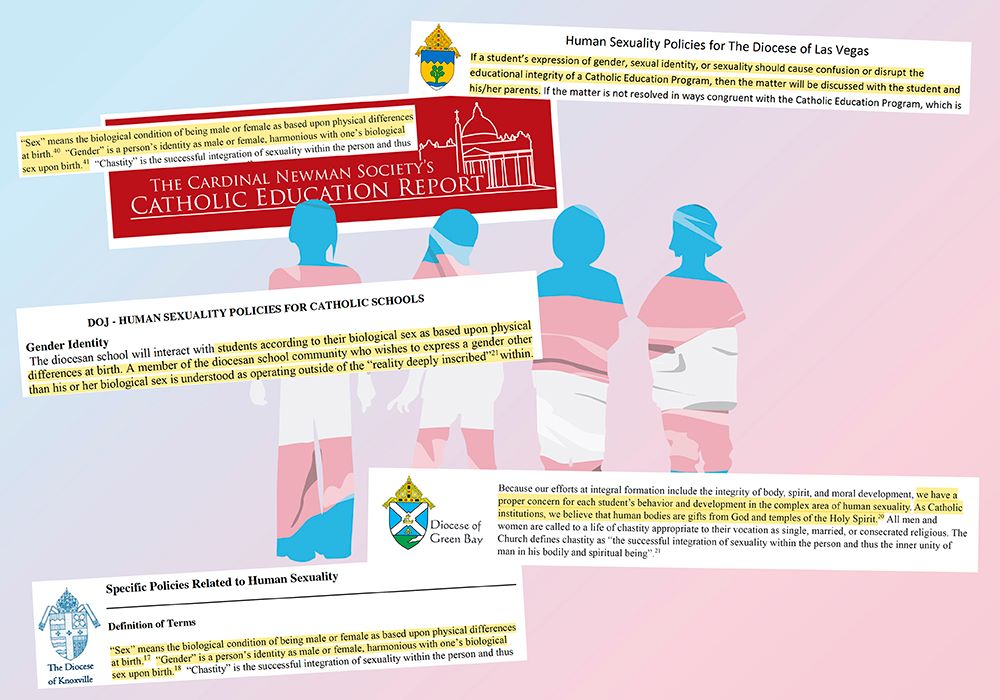
(NCR graphic/Toni-Ann Ortiz)
Over the past several years, as debates about transgender rights and medical treatments intensified both in the U.S. political sphere and the Catholic Church, two conservative Catholic groups have played a consequential but often undisclosed role as they attempt to shape policies and perspectives about trans individuals, especially young people.
Staff of the Person and Identity Project, an initiative of the Ethics and Public Policy Center in Washington, D.C., provide legal firepower to transgender-related court cases, have the ear of U.S. bishops, offer talks and resources to thousands of Catholics, and have served as consultants for an undisclosed number of controversial diocesan LGBTQ policies.
An NCR analysis additionally found a quarter of those diocesan guidelines contain at least some language that appears on a policy template created by The Cardinal Newman Society, a nonprofit based in a D.C. suburb and best known as a self-appointed watchdog for Catholic colleges.
The Person and Identity Project and the Newman Society similarly employ rhetoric that at times echoes right-wing talking points and assert that "gender ideology" — a term that for these groups includes acceptance of trans identities — is pervasive and harmful. Each adopts certain approaches seemingly at odds with Pope Francis and that depart from the Vatican's most recent doctrinal statement.
They also have received sharp criticism from a range of Catholics and LGBTQ advocates.
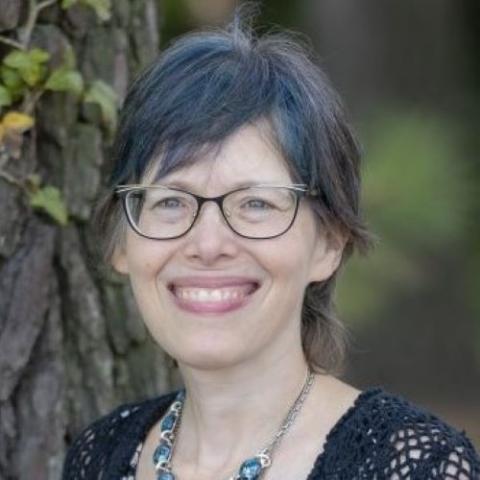
Dawn Eden Goldstein, a theologian and canon lawyer, is a former employee of The Cardinal Newman Society. (Courtesy of Dawn Eden Goldstein/Sarah Harris)
Dawn Eden Goldstein, a theologian and canon lawyer who embraces the church's traditional doctrine on gender and sexuality, previously worked for the Newman Society.
"I see in Cardinal Newman the culture war spirit of arming against an alien secular invasion," Goldstein said. The society "is not finding ways to teach students how to show appropriate Christian love while continuing to promote church teaching.”
NCR made multiple attempts to reach the Cardinal Newman Society, calling and emailing the president and founder of the organization and the vice president of marketing and communications. Cindy Laird, vice president of finance and operations, said May 16 the society would have no comment.

Mary Rice Hasson, a lawyer, is co-founder and director of the Person and Identity Project, an initiative of the Ethics and Public Policy Center in Washington, D.C. (CNS/Courtesy of Ethics and Public Policy Center/James O'Gara)
In October 2022, Mary Rice Hasson, co-founder of the Person and Identity Project and a consultant to the U.S. bishops' Committee on Laity, Marriage, Family Life and Youth, spoke at a parish-sponsored workshop near Philadelphia, where Christine Zuba was in the audience.
Zuba, a transgender woman and lifelong Catholic, called the event "a traumatic experience."
"Hasson paints a picture of the lives of trans and nonbinary people that doesn't really exist," the 67-year-old Zuba said. "It is a negative picture, an unhappy picture. It's a world that she's trying to convince people we live in."
Mitchell Muncy, executive vice president of the Ethics and Public Policy Center, told NCR in an email Person and Identity speakers "accurately and compassionately" present the medical, scientific, theological and current cultural environment on the topics they cover.
Hasson did not respond to NCR’s request for an interview.
Poised to combat gender ideology
The groundwork for the two groups' impact was set in 2016, around the time the current spate of U.S. legislation aimed at transgender people began.

(Unsplash/Tim Mossholder)
Ed Whelan, then president of the Ethics and Public Policy Center, a think tank supported by influential conservatives, praised a North Carolina law mandating transgender people use bathrooms that correspond with their sex as assigned at birth.
Permitting individuals to self-identify will "lead us down a dangerous path," Whelan said at a forum hosted by Rutgers Law School.
"When you lower the bar allowing trans people in the bathroom, you do make things easier for non-transgender perverts and harassers," he said.
To combat the perceived burgeoning cultural embrace of transgender advocacy and acceptance, Whelan's policy center launched the Catholic Women's Forum Gender Project, which evolved into the Person and Identity Project, to respond to "the challenges of gender ideology." The Newman Society produced a sample set of guidelines for Catholic schools that suggest officials reject trans identities and potentially expel transgender students.
There is no single definition for the phrase "gender ideology." The Person and Identity Project says it is a false system of beliefs that permit a person to self-determine their gender identity based on feelings or "sense of self" and "asserts an individual's 'right' to 'transition.' "
Steve Millies is a public theology professor and director of the Bernardin Center at the Catholic Theological Union in Chicago. He describes the phrase as a kind of linguistic basket "into which all kinds of not very closely related things get put."
"They are all things the church objects to, and because they concern gender and sexuality, we've tossed them together," Millies said.
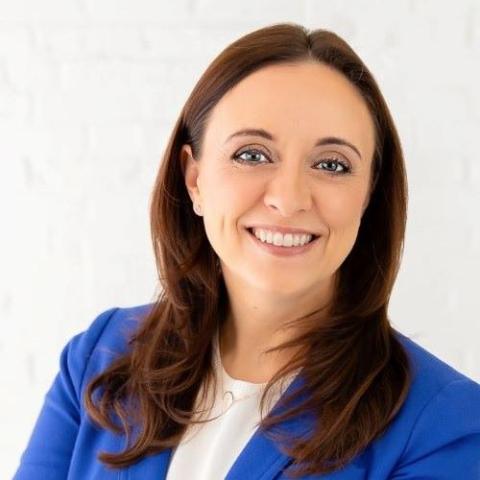
Elizabeth Sweeny Block is an associate professor of Christian ethics at St. Louis University. (Courtesy of Elizabeth Sweeny Block)
Elizabeth Sweeny Block, an associate professor of Christian ethics at St. Louis University, said the phrase is used to "condemn trans individuals, to deny their rights and to accuse those who support them of 'indoctrinating' youth."
The Person and Identity Project and Newman Society are among Catholic-backed U.S. organizations that have varying degrees of influence on trans issues and share overlapping views about what they say are the dangers of so-called gender ideology. Others include the medically focused American College of Pediatricians (not to be confused with the 67,000-member American Academy of Pediatrics), Catholic Medical Association and National Catholic Bioethics Center.
Copy and paste?
"A Catholic school cannot accommodate willful gender confusion," wrote Dan Guernsey, a Catholic school administrator and senior fellow at the Newman Society, as he announced in 2016 a new society resource he had co-authored: "Human Sexuality Policies for Catholic Schools."
Since that announcement, at least 15 U.S. diocesan LGBTQ policies have adopted language that appears in the document's 21 pages.
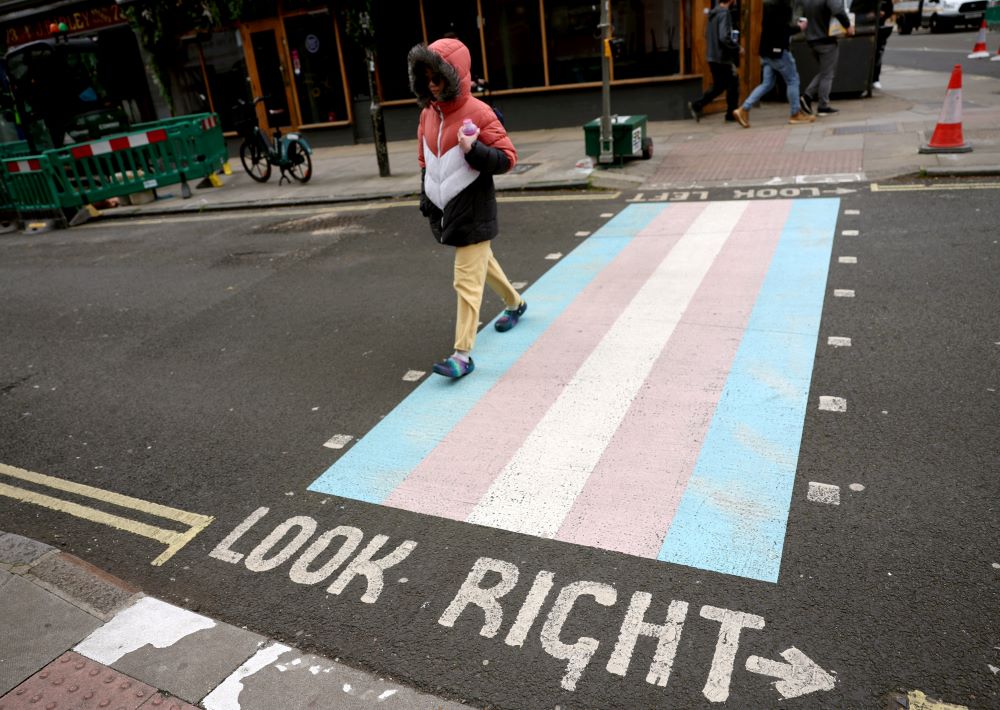
A person walks on a pedestrian crossing decorated with the pattern of the transgender flag on a street in London April 10. (OSV News/Reuters/Isabel Infantes)
A handful of dioceses use only a couple phrases, and all add portions and tweak wording. But five — the New York and Las Vegas archdioceses; and the dioceses of Green Bay, Wisconsin; Knoxville, Tennessee; and Joliet, Illinois — include large sections of the text.
The Newman Society document says its contents may be used or adapted without attribution. Two of the 15 diocesan policies cite the society's publication in footnotes. The rest do not mention the group. NCR used text-matching software and close readings to detect overlapping content.
Referencing the Catechism of the Catholic Church, Vatican texts and remarks by Pope Francis, the original document states schools "will interact with students according to their biological sex as based upon physical differences at birth." It also addresses same-sex attraction and multiple times quotes from the catechism that homosexuality is a "disordered" inclination.
Several dioceses adopted the Newman Society's caution at labeling individuals with the terms "gay," "lesbian," "bisexual" or "queer," even if "individuals might desire such identification." Labels may "falsely promote a lasting identification or enduring notion of self," they say.
The society's guidelines acknowledge some young people may feel drawn "to dress, act, and even manipulate their physical bodies in ways contrary to God's plan." They say parents and students should work with their pastor and other trained professionals "who might best assist them in clarifying and defining issues of self (and sexual) identity in accord with Catholic teaching and God’s natural plan."
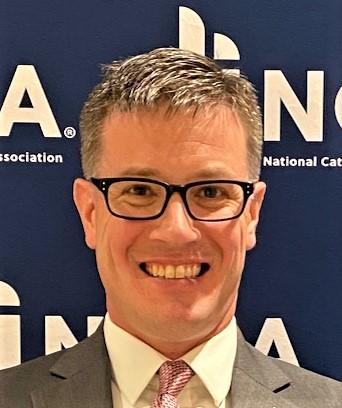
David Palmieri founded a network of Catholic school educators who accompany LGBTQ students. (Courtesy of David Palmieri)
Currently 58 dioceses, or nearly 30% of dioceses in the United States, are known to have guidelines focused on LGBTQ people, with most centered on trans individuals or those with gender dysphoria. Many address schools and require names, pronouns, facility use and attire to correspond with individuals' sex as assigned at birth. The total count is based primarily on a public folder compiled by Catholic school educator David Palmieri, an expert on the policies.
Palmieri, founder of Without Exception, a network of Catholic school educators who accompany LGBTQ students, noticed that many documents use similar language and saw a connection between the Newman Society and diocesan policies.
The 2022 Green Bay policy, for example, has nearly six pages with wording from the Newman Society template. It requires all staff and students to use pronouns and facilities consistent with their sex assigned at birth and says they can be expelled or terminated for failing to comply.
A portion of the Wisconsin diocese's guidance that seemed to equate being transgender to sexual harassment or abuse used language nearly verbatim from the Newman Society template:
Behaviors that are contrary to Catholic morality and the expectations of this diocese ["school" in the society's version] include but are not limited to: vulgar language and gestures of a sexual nature, … expressing a gender that is discordant with one's biological sex, adultery, … procuring an abortion, and sexual harassment or abuse.
Dignitas Infinita, a doctrinal document the Vatican released in April, places "sex change" interventions alongside what it sees as other affronts to human dignity, such as human trafficking. Yet it does not explicitly state, as the Newman Society and Green Bay documents do, that the act of expressing a gender other than one's biological sex assigned at birth, or being transgender, is immoral.
'Culture war fundraising'
Patrick Reilly, a former media consultant for the U.S. bishops and an adjunct professor at Holy Apostles College and Seminary in Cromwell, Connecticut, founded the Newman Society in 1993 "to promote and defend faithful Catholic education."
Patrick Reilly, president of the Cardinal Newman Society, speaks at Georgetown University Feb. 2, 2006. His organization in 2016 produced sample guidelines for Catholic schools that suggest officials reject transgender identities and potentially expel transgender students.(CNS photo/Dan Hunt)
Some Catholics champion the society, and retired U.S. Cardinal Raymond Burke, one of Pope Francis' most vocal cardinal detractors, at one time served as an "ecclesiastical advisor." The group is also listed as a resource on the U.S. bishops' website on marriage under "gender theory."
Other clergy — bishops among them — along with students, educators and university administrators have criticized the society for adopting what they see as an antagonistic approach and narrow view of Catholic orthodoxy and for using litmus tests to highlight perceived violations of dogma at Catholic institutions.
The Newman Society publishes criticism of Catholic universities that permit groups for LGBTQ students or invite politicians who support legal abortion to give commencement addresses.
Website posts bemoan the harm caused by critical race theory, "cancel culture," "woke-ism" and gender ideology.
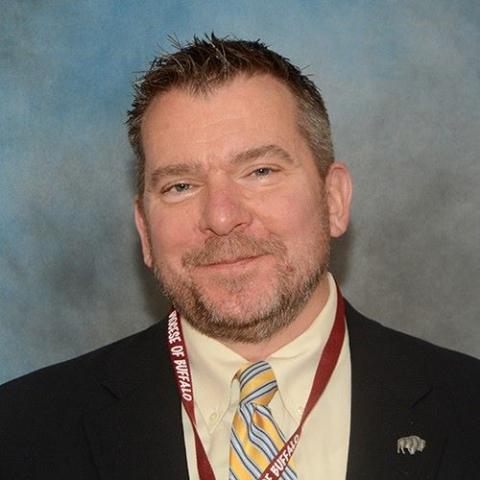
Tim Uhl is a former consultant to the U.S. bishops' education committee. (Courtesy of Tim Uhl)
Tim Uhl has been a longtime administrator in Catholic schools and previously served as a consultant to the U.S. bishops' education committee.
"I'm certainly not opposed to every position The Cardinal Newman Society takes; I'm not opposed to the idea that we need to build up the Catholic identity of our schools," Uhl told NCR in an interview.
But many of the society's positions and policies are presented “in such a way as to stir up anger and stir up interest and drive people to their causes," he said. "And that's not the same as a group writing fair policies to serve all Catholic children."
Goldstein, recalling her time working for the society, said Reilly "told me explicitly that they found they could raise more money if they did strictly watchdog stuff and did not do a positive initiative."
"That was my introduction to this whole concept of culture war fundraising," she said.
Reilly did not respond to NCR's questions about these comments.
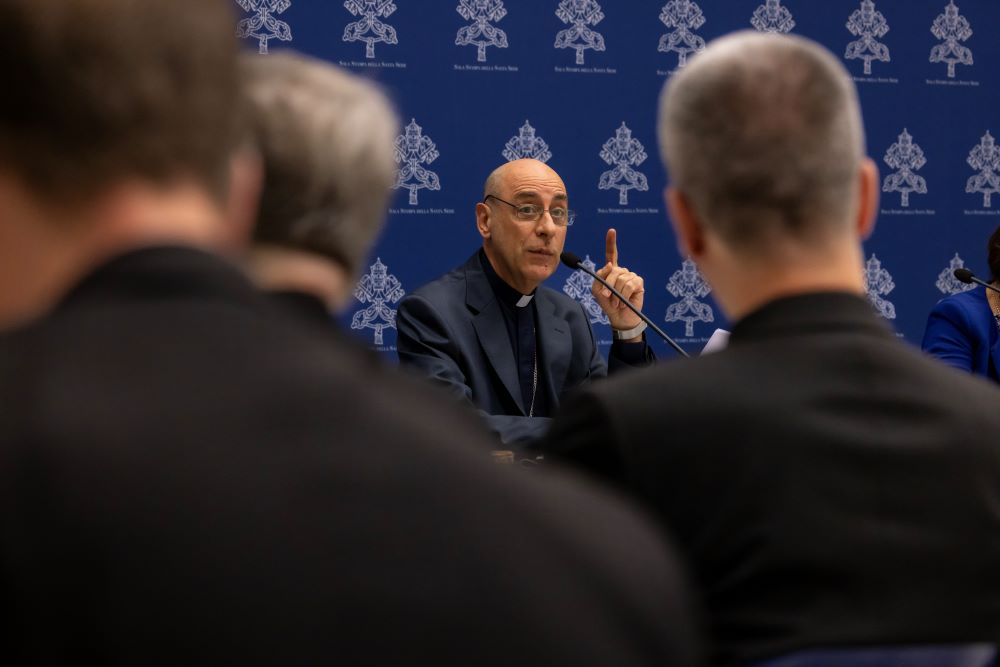
Cardinal Víctor Manuel Fernández, prefect of the Dicastery for the Doctrine of the Faith, speaks at a news conference to present "Dignitas Infinita" at the Vatican press office April 8. (CNS/Pablo Esparza)
Julia Sadusky is a Catholic psychologist in Colorado who works with individuals and families around sexuality and gender. NCR shared the Newman Society guidelines with her earlier this year and asked for her thoughts.
"My first impression was, wow, schools and dioceses must be really grateful to have a framework," said Sadusky, who said she often hears from Catholic school administrators who wish they had clear guidance on what to include in policies.
But the psychologist had questions about how the sample policies were formulated and who contributed to them.
"It would be important for me if I'm an educator implementing a policy to know that it was created through a multidisciplinary process, that the authors of that document represent philosophy, theology, psychology, endocrinology — all of the realms that impact the gender conversation in particular," she said. "I think any one discipline, myself included, will be incomplete in what we can offer Catholic schools."
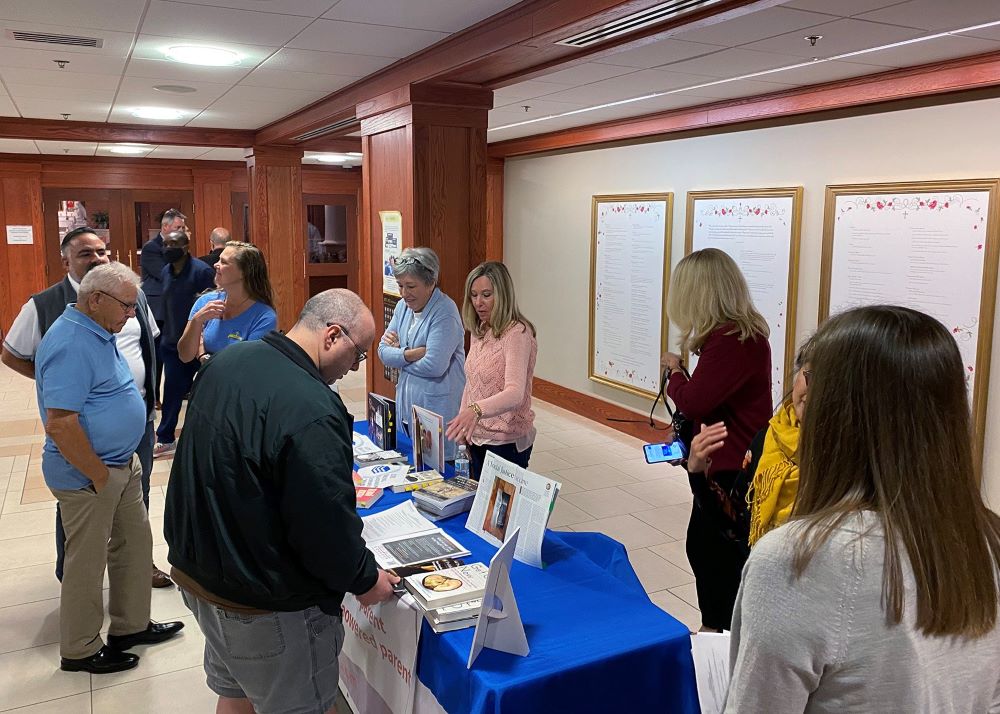
Attendees at an Oct. 23, 2021, conference on "Gender Ideology: The Cultural Challenge and the Catholic Response" browse material presented by the Parent and Child Loudoun organization at St. Theresa Church in Ashburn, Va. (CNS/Arlington Catholic Herald/Kevin Schweers)
Presentations and consultations
In 2021, Hasson, of the Person and Identity Project, gave a lecture at Christendom College, a small Catholic school in northwestern Virginia, during which she described "woke mobs” and a culture that tries to "silence truth tellers."
A lawyer and the highest-paid fellow at the Ethics and Public Policy Center according to 2023 tax filings, Hasson told the Christendom audience she'd been busy the previous year giving more than 50 talks, even as the pandemic persisted.
That pace appears to have accelerated. The project's most recent annual report says in 2023 it gave 101 presentations and policy consultations on gender ideology for churches, dioceses, religious schools and other faith-based organizations and reached more than 13,000 people.
Staff also offer workshops and formation trainings to bishops, pastors, teachers, administrators and parents. This April and May, Hasson led a six-week webinar for the San Francisco Archdiocese.
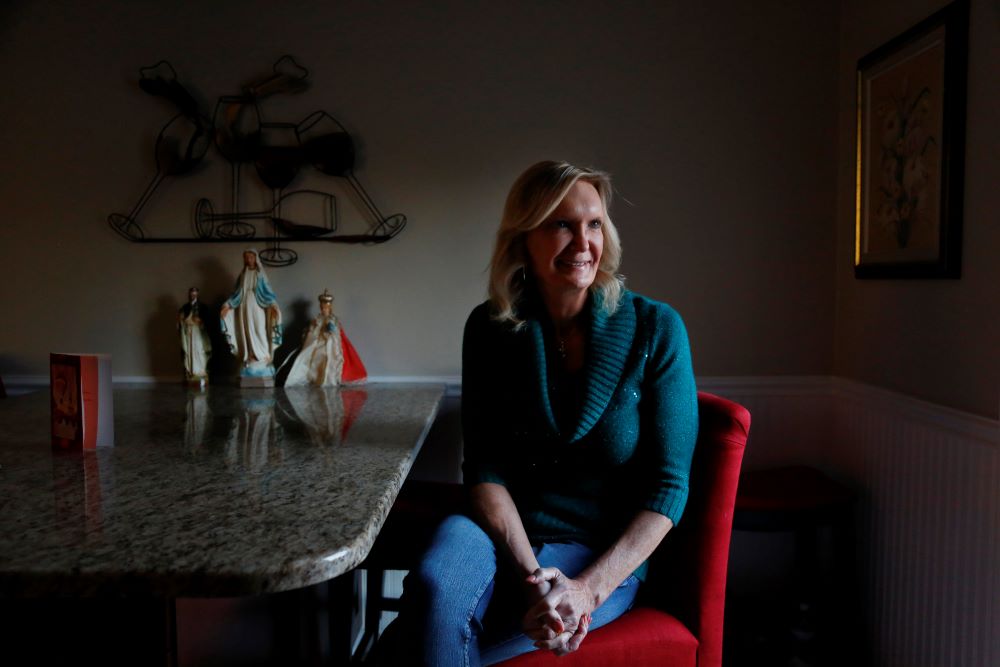
Christine Zuba poses in her kitchen in Blackwood, N.J. Feb. 14, 2022. Zuba, a transgender woman and lifelong Catholic, has attended two Person and Identity Project workshops. (AP/Jessie Wardarski)
Zuba, the transgender Catholic, attended two Person and Identity Project workshops, in 2022 and 2023, and said the tone at the second "was significantly less harsh" but that Hasson still used "scare tactics and exaggerations" about trans people, gender-affirming medical interventions and the "indoctrination" of children.
Muncy, of the Ethics and Public Policy Center, said such an accusation "tells us only about an individual's personal reaction" and does not "demonstrate anything about what a speaker actually said." He noted that people can watch Hasson's talks online to make their own judgment about how topics are covered.
In response to questions about the project's connections to diocesan gender identity policies, Muncy said anything not contained in the annual report is confidential.
In 2022 NCR confirmed that the project's leadership has served as consultants for diocesan LGBTQ policies, but staff would not disclose how many. Based on a recent NCR review, more than 20% of U.S. diocesan websites list the project as a resource for transgender and gender identity issues.
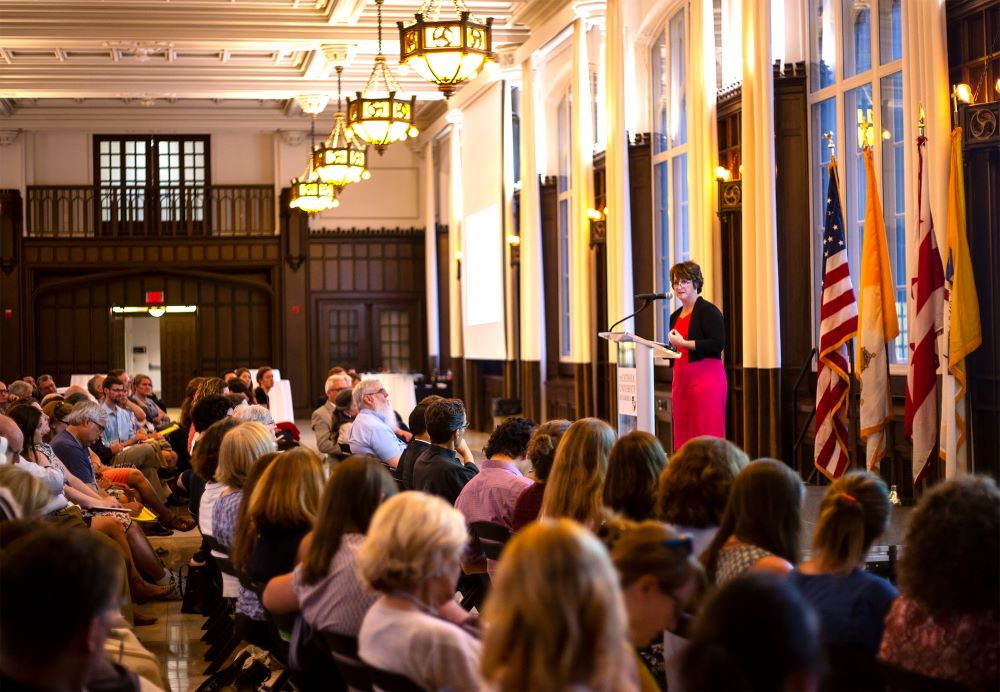
Mary Rice Hasson, co-founder of the Ethics and Public Policy Center's Person and Identity Project, speaks at the Institute for Catholic Liberal Education's national conference at the Catholic University of America in Washington July 22, 2019. (CNS/Courtesy of New Eve Media/Institute for Catholic Liberal Education)
In April 2023, the Diocese of Sioux City, Iowa, hosted a Person and Identity Project presentation for priests and deacons.
"It answered a lot of the questions I had and gave me some truth to keep people on the trail to salvation," Fr. David Hemann, a Sioux City pastor, told the diocesan communications publication. "Hopefully it will equip us to better speak to people in their confusion."
Five months after the presentation, Bishop R. Walker Nickless of Sioux City issued a policy that denies enrollment to students who identify as transgender and prohibits trans people from receiving the sacraments. The latter appears to conflict with an Oct. 31 Vatican statement allowing trans people, in certain instances, to serve as godparents and be baptized.
None of the diocesan LGBTQ documents cite the Person and Identity Project. But the notably extensive and restrictive policy the Denver Archdiocese issued in 2019 states it drew, with permission, "specific language or substantial portions" from a document co-authored by Hasson, Theresa Farnan and Susan Selner-Wright, all currently with the Person and Identity Project.
Farnan, Hasson's sister, previously was a consultant to the U.S. bishops' Committee on Laity, Marriage, Family Life and Youth, on which Hasson currently serves. The committee is led by Bishop Robert Barron, leader of the Diocese of Winona-Rochester, Minnesota, and founder of the media company World on Fire.
A page from the website "Love means more." features an article about "gender discordance." The U.S. Conference of Catholic Bishops' Committee on Laity, Marriage, Family Life and Youth — led by Bishop Robert Barron — launched the website this year. (NCR screenshot)
Early this year the committee launched an interactive website called "Love means more." that addresses a range of sexuality-related topics. A section on "gender discordance" prominently and repeatedly displays images and links for just two resources: the Chastity Project and the Person and Identity Project.
Person and Identity's website features toolkits, including in Spanish, for teachers, parents and administrators along with videos, articles, a "medical resources" section, and diocesan policies.
In 2019, Indiana-based OSV Institute, affiliated with the publisher Our Sunday Visitor and the news service OSV News, provided a grant of $110,000 to Catholic Women's Forum Gender Project, the precursor to the Person and Identity Project.
Jason Shanks, president of the institute, said in an email to NCR the grant was to conduct a survey of millennials' beliefs about sexuality and identity "and any barriers to understanding/accepting Catholic teaching regarding these issues."
One person involved with both the Newman Society and the Ethics and Public Policy Center is Frank Hanna III, a merchant banker in Atlanta who, according to tax filings, has served on the board of the Newman Society since 2016. Hanna is CEO of Hanna Capital and founder of the Solidarity Association — organizations that have financially backed the Newman Society and the policy center. Neither entity currently lists beneficiaries on its website; links with references are from internet archives.
An archived Hanna Capital webpage says the company concentrates its philanthropic endeavors on assistance to the poor, children, the church and promoting research on ways to better serve disadvantaged communities.
Archbishop Charles Chaput speaks during the opening Mass July 24, 2019, at the Napa Institute's annual Summer Conference in California. (CNS/Courtesy of Napa Institute)
Hanna's organizations also support the media conglomerate EWTN and the Napa Institute, a nonprofit known for its pricey events where wealthy business people, Republican politicians and bishops mingle over fine wines.
Hasson and Hanna have served on Napa's board of directors, and Hasson is slated to speak at this summer's Napa Institute conference July 24-28.
Hanna Capital also has funded the Sophia Institute, affiliated with EWTN and Crisis magazine, publisher of a book riddled with conspiracy theories by the radical traditionalist Catholic commentator Taylor Marshall.
Pastoral care and politics
The Catholic-focused Person and Identity Project is part of a much broader effort by the Ethics and Public Policy Center — currently headed by Ryan Anderson, who wrote a book arguing ideology and not science led to the current "transgender moment" — to curb medical interventions and laws intended to support transgender people.
Ryan Anderson is president of the Ethics and Public Policy Center in Washington. (CNS screen grab/YouTube/Catholic Media Ministry)
Tax filings show that between 2016 and 2023, the Ethics and Public Policy Center's revenue increased from $3.8 million to nearly $7.4 million. The biggest spike occurred in 2021, the year Alliance Defending Freedom, a Christian legal powerhouse backing laws that restrict trans rights, gave the think tank a $78,000 grant.
The following year, in 2022, the center's HHS Accountability Project, advocating for U.S. Health and Human Services Department "regulatory reform," shifted its focus from fighting the Biden administration's vaccine mandate to "the growing threat of gender ideology."
Hasson has spoken against including gender-affirming surgical interventions in veterans' medical benefits packages, and her name is on nine of about a dozen amicus briefs related to gender identity issues the policy center has filed over the past three years.
Ray Dever, a retired permanent deacon whose transgender daughter contemplated suicide before transitioning, said he's witnessed transgender people and their families increasingly living in fear in the United States. He described an "explosion of anti-transgender government actions restricting their legal rights and access to life-saving medical care."
"Every individual and organization that has intentionally spread misinformation about transgender people has contributed to this disturbing situation," he said, "and that should concern all people of faith and good will."
Advertisement
Unlike a number of critics, Sadusky told NCR she believes the Person and Identity Project is at its best when it addresses gender ideology, which she said "is distinct from a Catholic anthropology," and when it brings in philosophical principles "to critically engage with transgender affirmative care and to raise people's caution around some of the more activistic engagement that we have been seeing in the legal sphere."
But she worries about organizations that address theory while also weighing in on mental health issues.
"As a psychologist I'm always curious about the level of psychological education and expertise when people start talking about mental health concerns," she said.
Zuba contends the Person and Identity Project attempts to portray itself as "accompanying and respectful" by quoting the pope. But in fact, "they are undermining his work," she said.
Hasson told members of the Catholic Family Life Association in June 2023 that she likes "to begin with Pope Francis" because he has a heart for the marginalized and stresses the importance of accompaniment. But, Hasson added, it's important to also look at what he says.
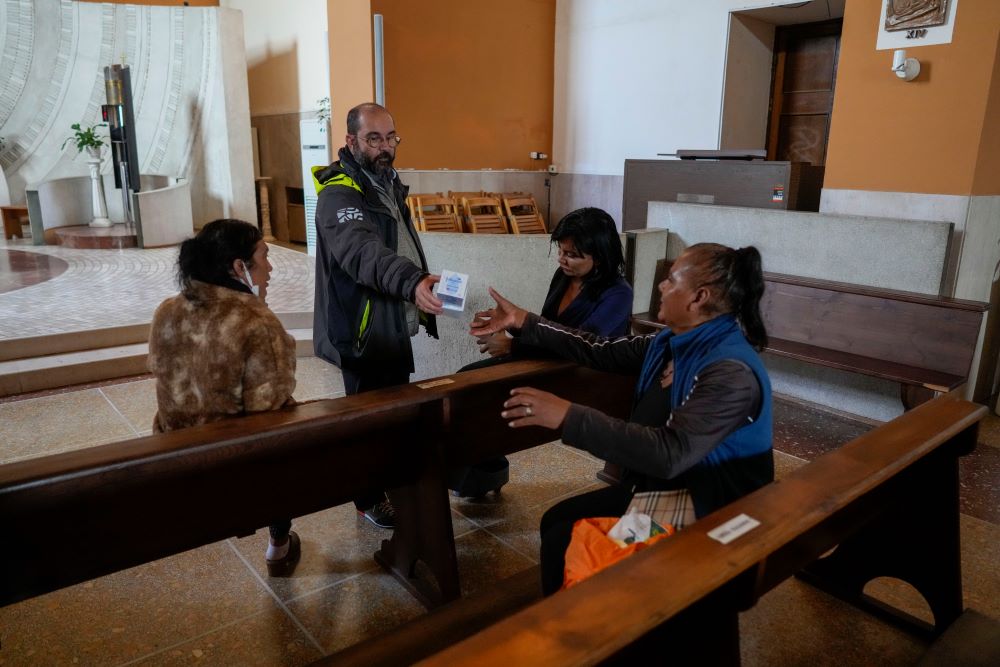
Fr. Andrea Conocchia, second from left, distributes personal hygiene items to transgender women as they sit in the Beata Vergine Immacolata parish church in Torvaianica, Italy, Nov. 16. Pope Francis has built an ongoing relationship of welcome with a community of trans women in Torvaianica. (AP/Andrew Medichini)
Francis has called gender ideology "the ugliest danger," and the Vatican's new document on human dignity strongly reaffirms that view.
But the pontiff, who meets with transgender people regularly and uses their preferred pronouns, distinguishes between pastoral ministry to trans people and his condemnation of gender ideology, which he recently said nullifies differences and makes everyone equal without respect to personal history. "Transgender people must be accepted and integrated into society," he told Loretto Sr. Jeannine Gramick, co-founder of the LGBTQ Catholic advocacy group New Ways Ministry.
Toward the end of her presentation to the Catholic Family Life Association, Hasson told participants to never "go down the pronoun path."
"No one has the right to compel you to say something that's not true," even if it is an adult who transitioned years ago, she said. "It's sort of a violation of boundaries for the person who identifies as trans to think that they can tell other people how they have to think and how they have to speak."
Children are either male or female, Hasson said at a Nov. 4 conference. "There are no trans kids."
Palmieri, the theology teacher, said groups like the Person and Identity Project and the Newman Society "have built fortress walls in defense of our Catholic faith."
"I don't think anybody across the spectrum on these issues would disagree that we need to be protective of our Catholic values and beliefs," he said. "But there's a narrow way to do that, which excludes anybody that would disagree, and then there's a more open way — a more Jesus-centered and I think a more Catholic way."






